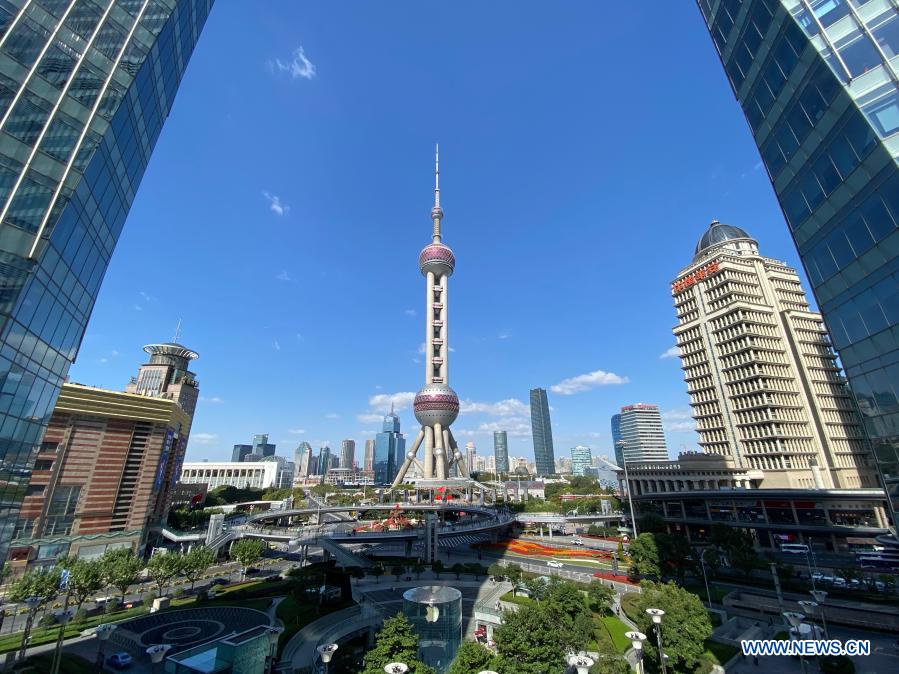

Photo taken on Nov. 3, 2020 shows the view of the Lujiazui area of Pudong, east China's Shanghai. [Photo/Xinhua]
China's unswerving commitment
Krishna Srinivasan, director of the Asia and Pacific Department of the IMF, told China Daily that rising geopolitical tensions in recent years have raised the risk that fragmentation pressures could add to global headwinds and cause a slowdown in trade and foreign direct investment flows.
Particularly, IMF estimates showed that the Asia-Pacific region could suffer significantly in a severe fragmentation scenario, with medium-term output losses of over 3 percent of GDP, Srinivasan said.
"In this context, China's ambition of high-quality opening-up that focuses on increasing trade and attracting foreign direct investment flows is very welcome," he said, adding that the country has played a key role in the development of regional and global value chains.
"Strong domestic policies and a focus on international collaboration can help achieve these goals," he said, adding that accelerating reforms to strengthen the real economy will be important for China to attract foreign investment.
Priorities include reforms to ensure competitive neutrality between private companies and State-owned enterprises, a further opening up of domestic markets, a greater reliance on market forces and tackling local protectionism, he said.
Srinivasan's remarks follow China's reiteration of its resolve to further open up its economy. Stressing that the country will open itself wider to the rest of the world, Premier Li Qiang said China will align with high-standard international economic and trade rules this year. He met the press on Monday after the closing of the first session of the 14th National People's Congress, the country's top legislature.
NPC deputies passed by voting resolutions on the Government Work Report on Monday, which set this year's target of GDP growth at around 5 percent.
As a vital engine of growth, China's economy is forecast by the IMF to grow by 5.2 percent this year and provide "a welcome boost" to the world economy by contributing around one-third of global growth in 2023, Srinivasan said.
Going forward, ensuring high-quality growth that is balanced, inclusive and green will require concerted reforms in China, including expanding domestic demand and shifting the composition of demand away from investment and toward consumption, Srinivasan said.
The latest Government Work Report said efforts are required to give priority to the recovery and expansion of consumption, underlining that the incomes of urban and rural residents should be boosted through multiple channels.
Fiscal policy can play a key role in rebalancing demand toward consumption as there remains room for China to shift fiscal expenditure away from infrastructure investment toward support for households, Srinivasan said.
Advisable specific measures include short-term labor tax relief — such as temporary cuts in wage earners' social protection contributions — or well-targeted direct transfers to vulnerable households, he said.
In the medium term, a systematic strengthening of the social protection system can help reduce precautionary savings and boost consumption, Srinivasan said, adding there is scope for China to increase unemployment and medical insurance benefits compared with other countries at similar or higher per capita income levels.
He said reforms in the real estate sector will also be helpful, such as increasing the quantity and quality of affordable public and rental housing.
Earlier this month, Srinivasan had called for stronger action from the central government to prevent property sector stress from dealing a big blow to the macroeconomy. He issued the call during the One-on-One Global Dialogue, a webinar on regional economic outlook organized by the International Finance Forum, or IFF.
The first two months of the year saw property sales stabilizing somewhat but still around one-third below the three-year average, underlining the need for Chinese policymakers to make further efforts to protect homebuyer interests, restore household confidence and pave the way for orderly developer restructuring, Srinivasan said.
